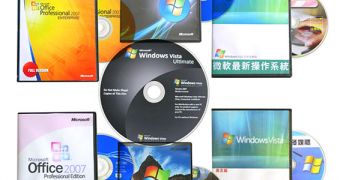Microsoft is labeling software piracy as a persistent and evolving crime. And despite this "anodyne" aspect, the Redmond company is going out of its way to help ensure that Windows pirates are well protected. According to data made available by The Business Software Alliance and market research firm IDC reported in the Global Software Piracy Study, the piracy phenomenon generated losses of $40 billion in 2006. The same estimates point to an overall piracy rate of 35% the past year.
"Software piracy is a persistent and evolving crime. Each year, the software industry, businesses and consumers are harmed by counterfeit software. Microsoft has increased its investments to address this challenge and help to protect businesses and consumers from the risks of counterfeit and unlicensed software," Microsoft revealed in a whitepaper focused on Product Activation for Windows.
While Microsoft's official perspective is that users of pirated materials are in fact victims, it is also positioning itself as a victim of the phenomenon. And in this context, the Redmond company introduced antipiracy mechanisms such as the Windows Genuine Advantage and the Office Genuine Advantage. Still, Microsoft is also managing to sabotage itself...
In early October, Internet Explorer 7 was stripped down of the WGA mechanism. Users accessing the latest version of Microsoft's browser no longer have to go through two validations of their Windows operating system in order to access the browser. Microsoft did not beat around the bush with the initiative and revealed that it did in fact open up access to IE7 to all users running non-genuine editions of Windows XP or Windows Server 2003. The reason stated was simple and related to the delivery of enhanced protection to the entire Windows environment, including here the pirated versions of the operating system.
So with one hand Microsoft is gunning down for Windows pirates and on the other it is embracing them just as legitimate customers. "All in all, Microsoft would like customers to expect fairness, great service, and a positive experience in the implementation of our anti-piracy measures," the company added. But it appears that Windows pirates should expect nothing less especially with Microsoft changing its mind on anti-piracy measures implemented and taking them down.
Stripping the WGA mechanism from the download and deployment process of IE7 spells either the failure of the anti-piracy measures or that of the browser to gain market share and to dislodge the install base from under IE6. Sure enough there is yet another explanation, involving Microsoft shifting its focus away from Windows XP.
"With Windows Vista and Windows Server 2008, a markedly different experience is offered as Windows Vista is among the first products from Microsoft to take advantage of the Software Protection Platform, an innovative platform from Microsoft that strengthens anti-piracy technologies to help better protect customers and improve the overall licensing experience," Microsoft stated.

 14 DAY TRIAL //
14 DAY TRIAL //